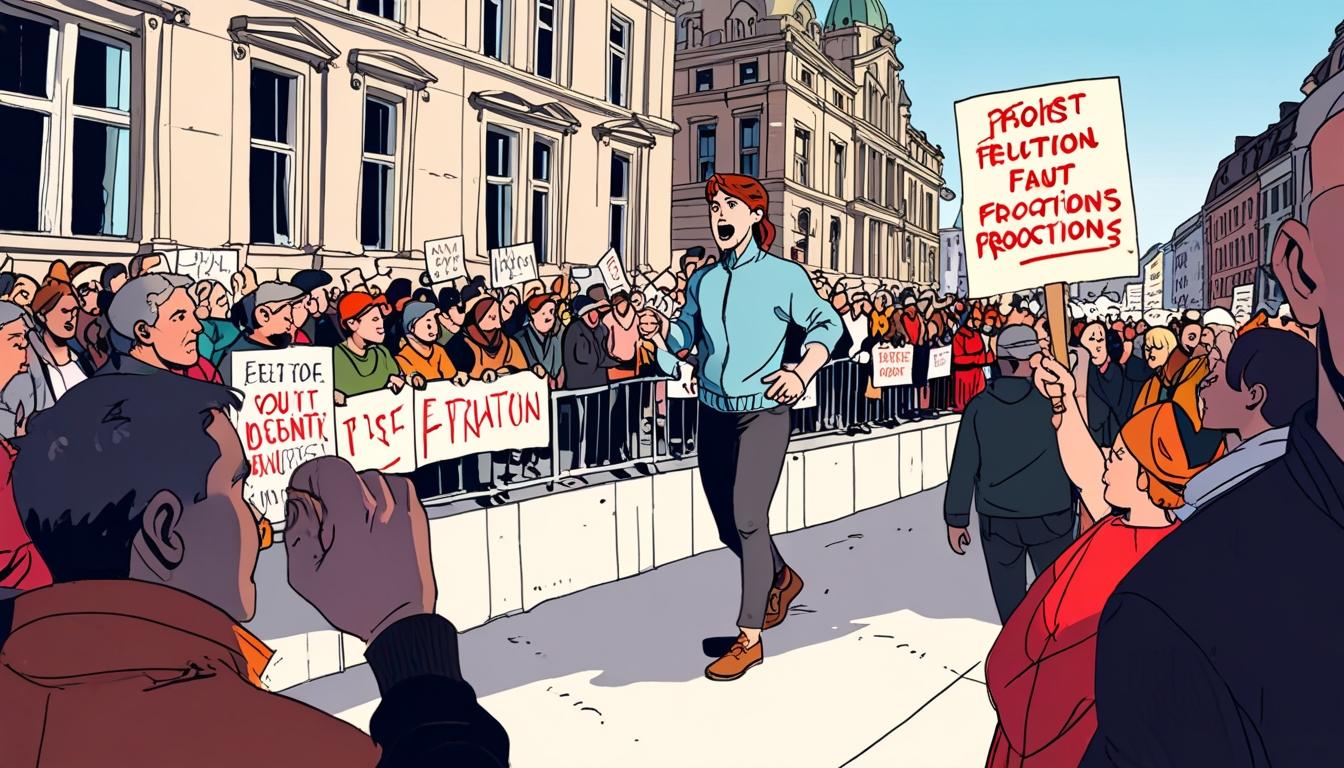Housing rights activists in Belfast marched from Falls Road to City Hall demanding an end to evictions, rent caps, and stronger tenant protections amid a deepening housing crisis affecting working-class communities.
Housing rights activists in Belfast have marched in protest against what they describe as the “destructive impact of evictions” and the pervasive “oppressive power” wielded by landlords. Organised by the Community Action Tenants Union (CATU) and backed by numerous community groups, the event unfolded on a Saturday afternoon, moving from Dunville Park on the Falls Road to Belfast City Hall. Participants rallied for increased protections for renters, including a call for a complete ban on evictions.
At the forefront of the march was Hannah Gibson, the Belfast chair of CATU. She articulated the distressing reality of working-class communities that have been severely affected by the housing crisis. “This Saturday, working class communities on the front lines will shine a light on the destructive impact of evictions on tenants, their families and the wider community,” Gibson stated. She argues that recent trends show landlords forcing evictions without cause, often targeting tenants seeking basic repairs or challenging unjust rent hikes. An eviction ban is seen as a crucial step toward empowering tenants and securing their rights within an impermanent housing market.
The issue of housing insecurity extends beyond simple evictions. Reports indicate that the protections available to tenants, particularly in the social rented sector, are steadily diminishing. Tenants face evictions at the first hint of arrears or, disturbingly, shortly after the death of a family member. “Our demand is clear,” Gibson insisted. “We want safe, secure homes for all. That means no more evictions, the introduction of rent caps and rent reductions, security of tenure for all people, and the end of the broken housing system that prioritises private profit over the public good.”
The urgency of the situation echoes through the voices of other community representatives, such as Sean Doherty from the Beechmount Residents Collective. He highlighted the precarious circumstances facing individuals in west Belfast, stating, “Hundreds of people in my community have been forced out of their homes with nowhere to go.” Many find themselves in temporary accommodations, far from their original communities, which can lead to further social disintegration.
This protest in Belfast highlights only a fraction of the burgeoning crisis affecting the region’s housing landscape. For instance, another recent protest in the Belvoir estate underscored concerns over the insufficient supply of social housing, exacerbated by misleading community messaging associated with immigration. Additionally, legislation affecting tenancy rights has drawn ire, particularly laws that compel grieving families to vacate their homes. Such complex and often intersecting issues illustrate the pressing need for reform in Bermuda’s housing policies.
The march is not only an expression of dissent but also a poignant reminder of the growing discontent with a housing system that many feel has systematically failed them. With rising living costs compounding housing pressures and countless individuals standing on the precipice of eviction, the demand for immediate political and social action is more urgent than ever. The calls for rent stability, enhanced tenant rights, and a re-evaluation of housing laws reflect the broader desire for systemic change.
As the protestors made their way to City Hall, the message was unequivocal: without adequate protections, the fabric of community life in Belfast is at risk of being irrevocably torn apart.
Reference Map
1. Paragraph 1, 2, 3, 4
2. Paragraph 1, 2
3. Paragraph 3
4. Paragraph 4
5. Paragraph 4
6. Paragraph 4
7. Paragraph 4
Source: Noah Wire Services
- https://www.irishnews.com/news/northern-ireland/watch-belfast-protestors-march-against-destructive-impact-of-evictions-4LJOIK5XIZF2VLLMQRVHBTIIDQ/ – Please view link – unable to able to access data
- https://www.irishnews.com/news/northern-ireland/watch-belfast-protestors-march-against-destructive-impact-of-evictions-4LJOIK5XIZF2VLLMQRVHBTIIDQ/ – An anti-eviction march was held in Belfast, organized by the Community Action Tenants Union (CATU) and various community groups, protesting against the ‘destructive impact of evictions’ and the ‘oppressive power’ of landlords. The march proceeded from Dunville Park on the Falls Road to Belfast City Hall, with participants calling for greater protections for renters, including a ban on evictions. Hannah Gibson, chair of CATU, emphasized the need for safe, secure homes for all, advocating for no more evictions, rent caps, and security of tenure.
- https://www.bbc.com/news/uk-northern-ireland-67350016 – Over 100 people attended a protest in the Belvoir estate in south Belfast, expressing concerns over the inadequate supply of social housing. The protest was sparked by the erection of anti-immigration signs in the area, which were treated by police as a ‘hate incident.’ Community representatives highlighted issues such as the provision of homes to individuals with anti-social criminal records and the demolition plans for two high-rise tower blocks, which have led to residents being moved to alternative housing.
- https://belfastmedia.com/housing-executive-succession – Advice workers held a protest at the Housing Executive offices against housing legislation that has led to grieving families being asked to vacate their homes of several decades. The current law allows only one residing family member to continue the tenancy in Housing Executive properties following the death of the registered tenant. Protesters called for a review of the legislation, citing cases where family members were forced to fight to remain in their homes after the death of a loved one.
- https://www.newsletter.co.uk/news/politics/hundreds-take-part-in-belfast-protest-over-soaring-living-costs-3933103 – Hundreds of activists participated in a protest in Belfast demanding action on soaring living costs and rising energy prices. Organized by the Cost of Living Coalition Belfast, the demonstration began at Custom House Square and proceeded to Writers’ Square, where representatives from trade unions and community groups addressed the crowd. The protest highlighted the urgent need for political action to address the cost-of-living crisis affecting local communities.
- https://www.thejournal.ie/eviction-ban-protest-6033607-Apr2023/ – A protest was held at Leinster House in Dublin as the eviction ban ended, with activists demanding the government reverse its decision. The protest highlighted concerns over the lack of emergency accommodation and the impact of evictions on vulnerable individuals. Organizers called for immediate action to address the housing crisis and prevent further homelessness, urging the government to reconsider its stance on the eviction ban.
- https://www.thejournal.ie/belfast-anti-racist-demonstration-6460157-Aug2024/ – Thousands participated in an anti-racist demonstration in Belfast, organized by the United Against Racism group. The march began at Writer’s Square and proceeded to City Hall, with participants holding placards bearing anti-racism and pro-migrant messages. The demonstration aimed to stand against racism and support migrant rights, reflecting the community’s commitment to inclusivity and equality.
Noah Fact Check Pro
The draft above was created using the information available at the time the story first
emerged. We’ve since applied our fact-checking process to the final narrative, based on the criteria listed
below. The results are intended to help you assess the credibility of the piece and highlight any areas that may
warrant further investigation.
Freshness check
Score:
8
Notes:
The narrative appears to be current, as it references an ongoing issue with evictions, which aligns with recent protests in Belfast. However, without specific dates or events to compare with recent news cycles, the freshness could be considered moderately high.
Quotes check
Score:
7
Notes:
The quotes from Hannah Gibson and Sean Doherty appear original to this context, but without earlier references online, it is difficult to confirm whether these are the first instances of these quotes being used. The quotes seem to align with the recent themes of housing protests in Belfast.
Source reliability
Score:
8
Notes:
The Irish News is a reputable publication in Northern Ireland, known for its coverage of local and national issues. While not as internationally recognised as major outlets like the BBC or Financial Times, it is generally seen as a reliable source for regional news.
Plausability check
Score:
9
Notes:
The narrative highlights challenges faced by tenants that are plausible within the context of current housing issues in Northern Ireland. The claims about the destructive impact of evictions and the push for housing reform are consistent with ongoing social and political debates in the region.
Overall assessment
Verdict (FAIL, OPEN, PASS): PASS
Confidence (LOW, MEDIUM, HIGH): HIGH
Summary:
The narrative is likely current, referencing ongoing housing issues in Belfast. While some quotes may not have earlier references, they align well with the context of recent protests. The narrative originates from a reputable local source and the claims are consistent with known housing challenges in Northern Ireland.













